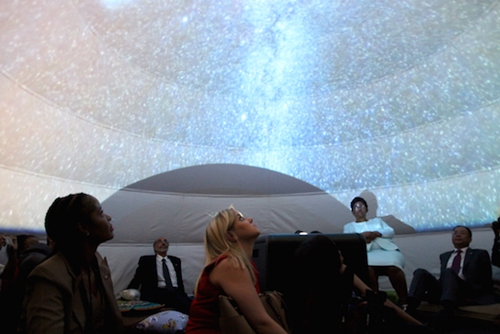


A planetarium was launched at the Sci-Bono Discovery Centre in Newtown on March 7.? (Picture: PEOPLE’S DAILY ONLINE/ ZHANG JIEXIAN)
South African children are encouraged to discover the universe through a newly launched planetarium at the Sci-Bono Discovery Centre in Newtown, Johannesburg.
The launch of the planetarium coincided with the handover of 2,000 Mandarin textbooks, as part of a strategic partnership on education between governments of SA and the People’s Republic of China.
Learning of the Chinese language is noted as the fastest- growing area of cultural exchange between the two nations. Mandarin was incorporated in SA’s national curriculum as a non-official language in 2015. Doubts have been raised about the decision, with insinuations that the introduction of Mandarin would be detrimental to SA’s indigenous languages.
Gauteng Education MEC Panyaza Lesufi clarified this by saying that it would be up to pupils whether they choose to learn the Chinese language at public schools in the province.
Mandarin is implemented on a second additional language level in a selected number of schools. Other language options in the same category include German, Spanish, Portuguese, Latin, Serbian, Tamil, Telegu and Urdu.
According to the Department of Basic Education, there are at least 14 pilot schools currently teaching Mandarin and a list of 13 other schools has been pro- posed for 2016.
“It’s impressive to see the way they pronounce properly,” said Minister of Basic Education Angie Motshekga on the pupil’s performance in Mandarin.
She doesn’t see the discourse as a major problem. “We have historical high-level partner- ships with the Chinese government. Perhaps we have not been able to develop the relationship among some of the population. It’s a communication exercise.”
Motshekga said that most schools are requesting Mandarin courses, but with limited resources the department has to roll them out gradually to ensure quality teaching. Some of the state institutions and government departments are learning
the Chinese language as well. “I’m part of them and it’s really exciting to learn something different,” said Motshekga.
The trend coincides with the growing interests in Chinese language learning around the world. It is estimated that more than 100-million people are learning Mandarin as a foreign language. More than 500 Confucius Institutes and more than 1,000 Confucius Classrooms have been established in 134 countries. In the US alone, there are more than 100 Confucius Institutes and close to 30 in the UK. SA is home to five Confucius Institutes and three Confucius Classrooms.
Li Song, Charge d’ Affaire of China to SA, speaking at the launch of the planetarium, said that Mandarin can be a practical skill of self-development.
“For the numerous visitors the planetarium is about to receive, maybe only a few would go on to become astronomers or space scientists. For the thou- sands of student who are learning Chinese, it’s very likely that many will not associate their later work or life experience entirely with China. But the meaning of what we are doing here today is beyond that. The true value of today’s gift is to ensure that the curiosity of our children for the unknown world — be it nature, language, culture or people — is encouraged and cultivated, so that they can be more motivated, accepting and united.”
Under the framework of Forum on China-Africa Cooperation, China has offered 55,000 scholarships to Africa and has trained 83,000 people. SA’s Department of Higher Education and Training and Department of Basic Education have signed cooperation agreements with the Chinese Ministry of Education. More than 20 Chinese universities have established partnerships with schools in SA. The combined population of international students between the two countries has grown to more than 4,000.
(The story was originally published on Business Day on March 31st, 2016.)
 The evolution of J-10 fighter
The evolution of J-10 fighter Top 10 Asian beauties in 2016
Top 10 Asian beauties in 2016 Train rides through blossoms
Train rides through blossoms HD pictures of battleships of PLA Navy
HD pictures of battleships of PLA Navy East Sea Fleet conducts combat drills
East Sea Fleet conducts combat drills Sophie Marceau goes square dancing in Guangzhou
Sophie Marceau goes square dancing in Guangzhou Police officers learn Wing Chun in E. China
Police officers learn Wing Chun in E. China Charming models compete in super model contest in Beijing
Charming models compete in super model contest in Beijing Beauties wearing Tang dynasty costume pick tea leaves
Beauties wearing Tang dynasty costume pick tea leaves Top 20 hottest women in the world in 2014
Top 20 hottest women in the world in 2014 Top 10 hardest languages to learn
Top 10 hardest languages to learn 10 Chinese female stars with most beautiful faces
10 Chinese female stars with most beautiful faces China’s Top 10 Unique Bridges, Highways and Roads
China’s Top 10 Unique Bridges, Highways and Roads Racing to the self-driving car
Racing to the self-driving car Consensus needed to impose pressure on Pyongyang
Consensus needed to impose pressure on Pyongyang Suu Kyi meeting heralds good beginning for Sino-Myanmar ties
Suu Kyi meeting heralds good beginning for Sino-Myanmar ties Chinese tourists walk in footsteps of Marx and Lenin in UK, Russia
Chinese tourists walk in footsteps of Marx and Lenin in UK, RussiaDay|Week